The 32-year-old organization continuously works to inspire generations to carry forth
Japanese American service members’ legacy of patriotism, service and resilience.
By Patti Hirahara, P.C. Contributor
When we think about military organizations, the American Legion, the VFW — Veterans of Foreign Wars — and Disabled American Veterans come to mind, but for Japanese Americans, national veteran organizations such as Go for Broke National Education Center and the Japanese American Veterans Assn. are the ones who tell our stories.
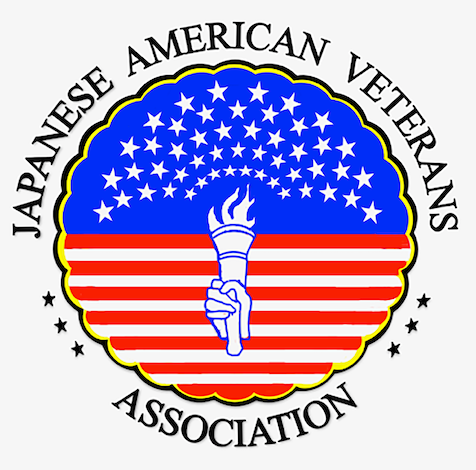 JAVA, which was formally established in 1992 in Washington, D.C. as a 501(c)(19) nonprofit Veterans Service Organization — though its roots date back to earlier informal gatherings of Japanese American Nisei soldiers who served during World War II — functions as an educational, patriotic and fraternal organization dedicated to maintaining and extending the institutions of American freedom while honoring the valor, patriotism and sacrifices of Japanese American service members.
JAVA, which was formally established in 1992 in Washington, D.C. as a 501(c)(19) nonprofit Veterans Service Organization — though its roots date back to earlier informal gatherings of Japanese American Nisei soldiers who served during World War II — functions as an educational, patriotic and fraternal organization dedicated to maintaining and extending the institutions of American freedom while honoring the valor, patriotism and sacrifices of Japanese American service members.
The organization includes veterans of WWII, Korea, Vietnam and the Gulf Wars, in addition to active-duty Japanese American service members. Its goals and objectives are varied, namely focused on providing assistance, as needed, to member veterans and their spouses, care givers and dependents; perpetuating the memory of Nisei veterans and their families; conducting educational programs to emphasize the contributions of Asian American Native Hawaiian and Pacific Islander war veterans; sponsoring social and recreational activities in keeping with the patriotic spirit of national holidays; providing financial assistance and scholarships for deserving descendants of Japanese American veterans; and working with other veterans’ organizations, including the Military Intelligence Service, the 442nd Regimental Combat Team and the 100th Infantry Battalion groups.
Patti Hirahara for the Pacific Citizen had the opportunity recently to interview Howard S. High, who is the new president of JAVA, overseeing more than 1,000 members in the organization’s database.
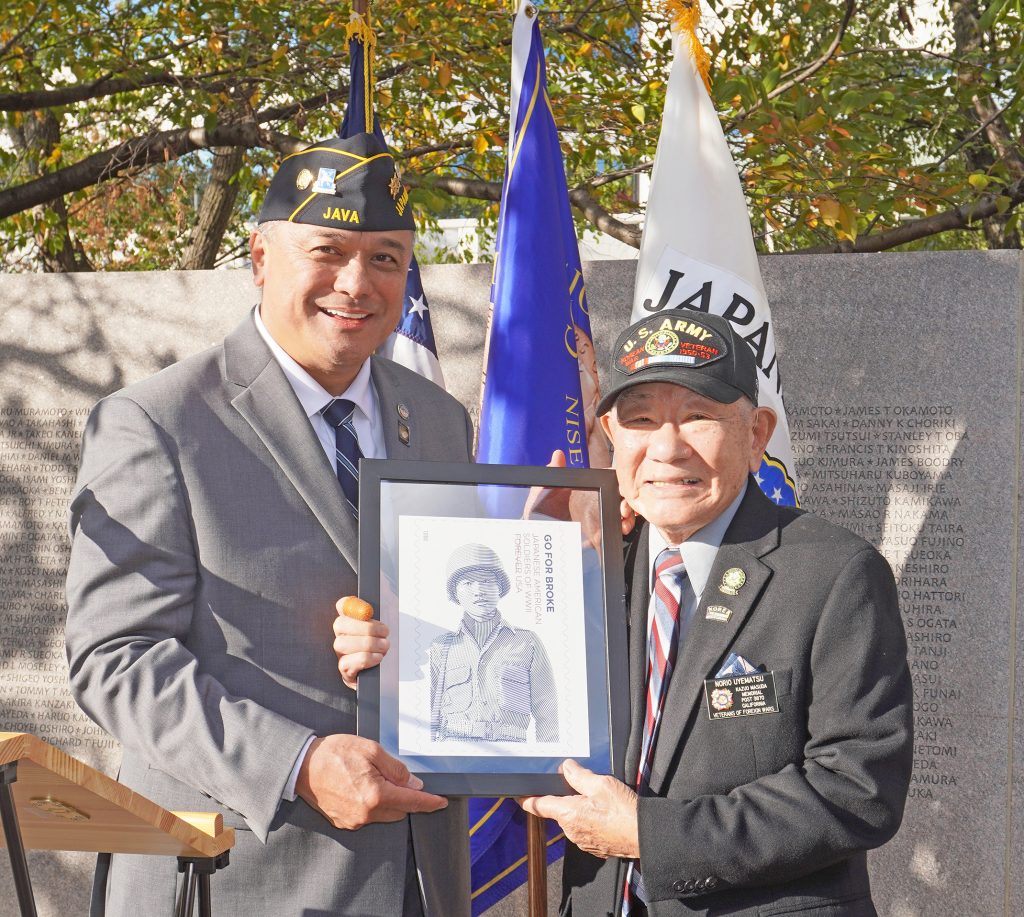
JAVA President Howard High (left) gives a token of appreciation to Veterans Day keynote speaker Norio Uyematsu at the organization’s Nov. 11 event. (Photo: Patti Hirahara)
PATTI HIRAHARA FOR THE PACIFIC CITIZEN: What makes your organization different from other military organizations?
HOWARD S. HIGH: JAVA serves as both a historical and advocacy organization, focusing on educating the public about this paradox of loyalty and injustice. Unlike many military organizations, JAVA intertwines the preservation of history with outreach to inspire younger generations.
Additionally, JAVA honors the service and sacrifices of all veterans, inspired by the WWII Nisei soldiers’ values of courage, equality and loyalty. We preserve their legacy, support veterans and families and promote unity and understanding through education, service and advocacy. JAVA is involved internationally and maintains and strives to strengthen its friendship with Japan, honoring the Issei who instilled the ethics and values resulting in the unparalleled service of the WWII Nisei soldiers.
HIRAHARA: Your new honorary chairperson is Gen. Paul M. Nakasone. Can you tell me about his background?
HIGH: Retired U.S. Army Gen. Paul M. Nakasone is a distinguished leader and trailblazer in the field of cybersecurity and national defense. On June 1, 2024, he joined Vanderbilt University, following an illustrious military career highlighted by his tenure as the commander of U.S. Cyber Command, director of the National Security Agency and chief of the Central Security Service from May 2018-Feb. 2, 2024.
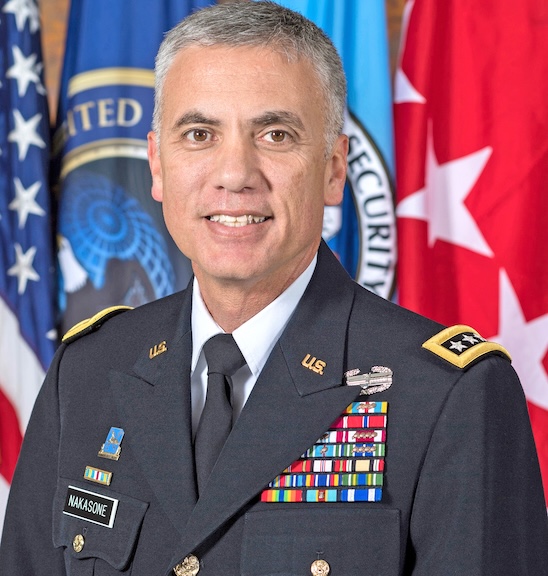
JAVA Honorary Chairperson Gen. Paul M. Nakasone (Photo: Courtesy of the Department of Defense)
A native of White Bear Lake, Minn., Gen. Nakasone’s career spans a series of critical assignments across the United States and abroad, including deployments to Iraq, Afghanistan and the Republic of Korea. His command roles include leading the U.S. Army Cyber Command and the Cyber National Mission Force. He has also served as a senior intelligence officer at the battalion, division and corps levels, as well as director of intelligence for the International Security Assistance Force Joint Command in Kabul, Afghanistan.
His contributions to national security have earned him numerous awards and decorations, including the Distinguished Service Medal (with oak leaf cluster), the Defense Superior Service Medal (with three oak leaf clusters), the Bronze Star and the Legion of Merit, among others.
Gen. Nakasone’s life and career are a testament to his unwavering commitment to service, leadership and the advancement of cybersecurity and intelligence, while maintaining a profound connection to his heritage and community. We are so happy he has become our JAVA honorary chairperson, where he actively supports our mission to preserve and celebrate the contributions of Japanese American service members. His involvement reflects his dedication to ensuring future generations recognize and honor the sacrifices and achievements of these brave individuals, and we look forward to his participation.
HIRAHARA: What activities do you hold each year?
HIGH: JAVA hosts a variety of events and activities annually, which includes:
- Annual “Freedom Walk,” co-hosting with the National Japanese American Memorial Foundation
- Annual Memorial Day Ceremony, held at Arlington National Cemetery
- A Scholarship Program
- Day of Affirmation, named because of President Harry Truman’s salute to the Japanese American troops where he said, “You fought not only the enemy, but you fought prejudice — and you have won.” This affirmed that the Japanese American troopers, women and men, who served throughout WWII are America’s heroes and removed any doubt that they are loyal citizens of America
- Veterans Day Program, recognizing and celebrating veterans from all conflicts
- Speaker Series, including lectures, webinars and panel discussions on topics related to Japanese American military history and ongoing service
- Community Outreach, collaborating with schools, museums and cultural institutions to educate about Japanese American military history
- JAVA Luncheons and Social Gatherings, fostering camaraderie and connection among members
- Support for Exhibits and Publications, supporting photo exhibits, books and documentaries showcasing the Japanese American military experience.
HIRAHARA: What would you like prospective members to know? What is your goal for the organization’s future?
HIGH: JAVA is not just for Japanese Americans — it is open to anyone who supports its mission of honoring Japanese American Nisei soldiers of WWII and educating the public about their sacrifices and contributions. Membership provides an opportunity to connect with a vibrant, multigenerational community united by shared values of service, sacrifice and education.
As president of JAVA, my vision is to broaden our organization’s impact. I am committed to expanding JAVA’s national and international presence, ensuring that our association’s purpose, mission and activities are widely known and appreciated.
To realize these goals, I am dedicated to encouraging greater participation from our members in supporting JAVA’s initiatives, and together, we will champion veteran causes, educational programs and cultural events that reflect our shared history and values.
Through these efforts, we hope to honor the past and inspire future generations to carry forward the legacy of patriotism, service, honor and resilience that will define JAVA in the U.S. and throughout the world.
JAVA Hosts Veterans Day Program in D.C.
Korean War veteran Norio Uyematsu serves as the event’s keynote speaker.
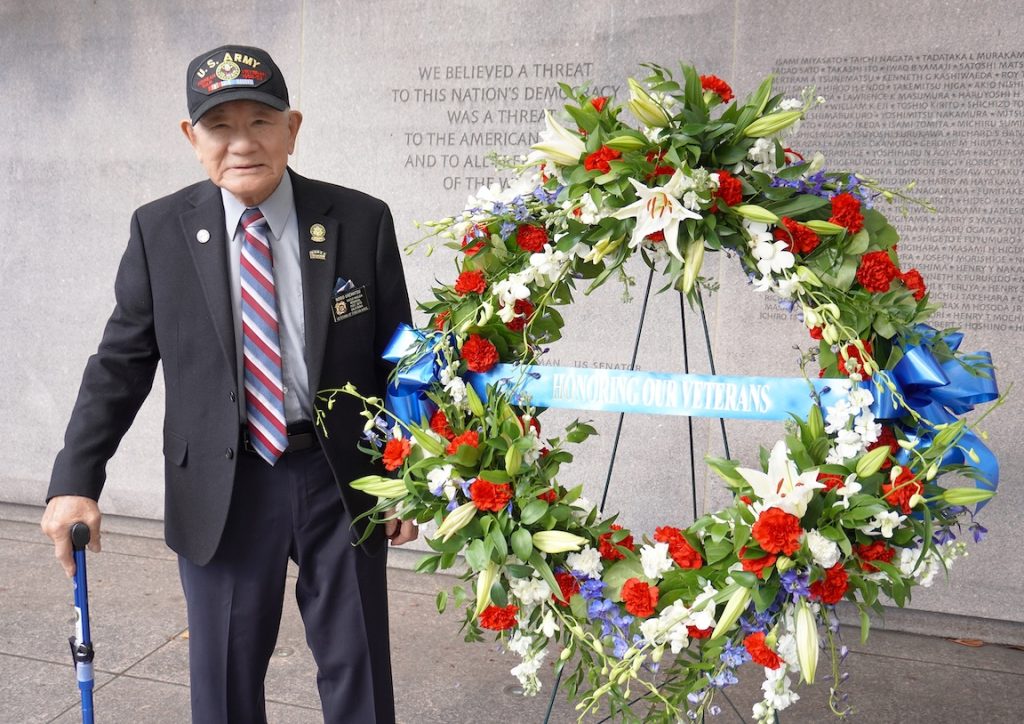
Kazuo Masuda Memorial VFW Post 3670 past three-time Post Commander Norio Uyematsu (Photo: Patti Hirahara)
The Japanese American Veterans Assn. held its 2024 Veterans Day program at the National Japanese American Memorial to Patriotism During World War II in Washington, D.C., on Nov. 11, welcoming 93-year-old keynote speaker Norio Uyematsu, a veteran of the Korean War, who traveled from California to attend the event.
This year marked the 70th anniversary of the official name change from Armistice Day to Veterans Day in 1954. Originally, Armistice Day was a holiday dedicated to those who fought in what had been known as “the war to end all wars” following World War I, but Congress changed the name to Veterans Day to reflect a broader purpose to honor veterans of all war conflicts on Nov. 11 each year.
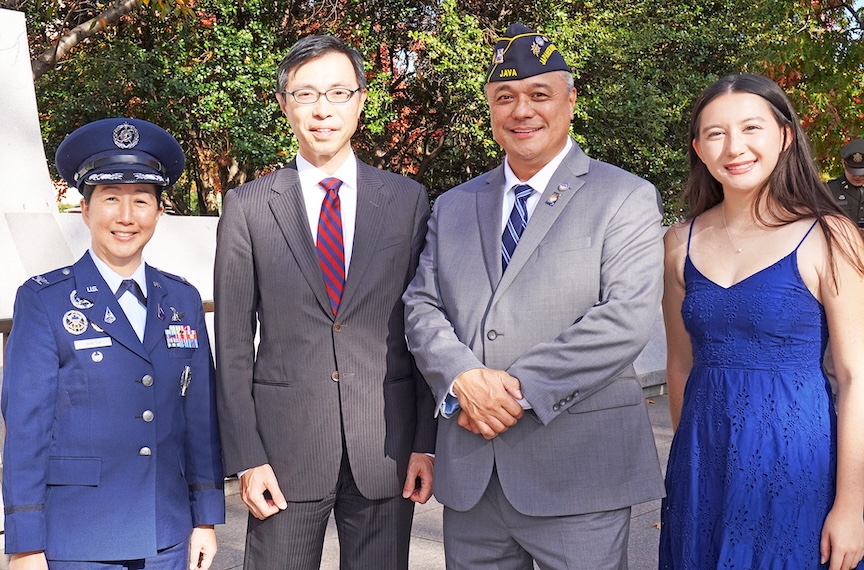
Col. Mia Walsh (left), U.S. Space Force, at the JAVA event in Washington D.C. alongside Minister and Head of Chancery Masaru Sato, Embassy of Japan in USA; JAVA President Howard S. High; and Taylor Walsh (Photo: Patti Hirahara)
Among the dignitaries present at the event were JAVA President Howard S. High; event emcee and JAVA VP Col. Danielle Ngo, U.S. Army, Ret.; Col. Mia Walsh, U.S. Space Force; Masaru Sato, minister and head of chancery, Embassy of Japan; Katsumi Ishiguro, consul, Embassy of Japan; JACL Executive Director David Inoue; former JAVA President Gerald Yamada; and Lt. Col. Mark Nakagawa, U.S. Army Ret., a JAVA executive council member.
Japanese American Korean War veteran Uyematsu is a three-time post commander of the Kazuo Masuda Memorial VFW Post 3670 and its oldest member. In his speech before the gathered audience, Uyematsu gave a new perspective on what the Nisei endured during WWII who were too young to enlist.
Uyematsu remembered what the 442nd accomplished during WWII, and he wanted to enlist in the U.S. Army to honor those brave men and women who came before him. Uyematsu was honored to talk about his service in the Korean War as a member of the 521st Military Intelligence Service, one of 5,000 Japanese Americans who fought and served in that conflict.
The Korean War began on June 25, 1950, and ended on July 27, 1953, without an official end. In all, some 5 million soldiers and civilians lost their lives in what many in the U.S. refer to as the “Forgotten War” for the lack of attention it received. It was one of the shortest wars but also the deadliest.
“I don’t think many of you know that the 521st Military Intelligence Service platoon was cited for exceptionally meritorious conduct in the performance of outstanding services in support of combat operations in Korea,” Uyematsu said. “In the commendation, it said, ‘The determination, technical skill and willingness to assume additional responsibilities exhibited by the members of this platoon reflect great credit on themselves and the military service of the United States.’ This was quite an honor for us in this forgotten war.”
He continued, “It is interesting, in recent years, that the term the ‘Nisei Experience’ only reflects the service of those that served in WWII, and the U.S. Army Museum has no mention of our service and only a small display on the Korean War.
“Those of us that served in the Korean War were also second generation or Nisei, incarcerated in concentration camps on American soil behind barbed-wire fences, fought for our country of the United States of America, but too young to enlist when we were in camp. Our service has been forgotten to be recognized, but our experience was real.”
Uyematsu also added, “For those of us who fought in the Korean War, our race was labeled as ‘Mongolian’ rather than Japanese, and it has never been corrected on our personnel records to this day.”
He also told the audience about a disastrous fire at the National Personnel Records Center on July 12, 1973, where approximately 16 million-18 million Official Military Personnel Files were destroyed. “That day, our sacrifices went up in a cloud of smoke,” Uyematsu recalled.
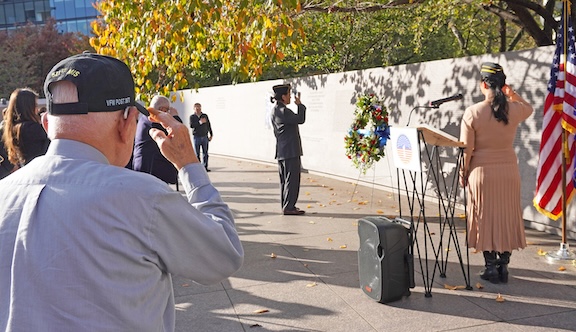
At the conclusion of the program, Lt. Col. Mark Nakagawa, U.S. Army, Ret., and JAVA executive council member salutes those who lost their lives during WWII with Col. Danielle Ngo, U.S. Army, Ret., and JAVA vp, and speaker Norio Uyematsu (in foreground). In the military, the salute is a time-honored tradition that symbolizes respect, recognition and unity. (Photo: Patti Hirahara)
The records affected personnel who served in the U.S. Army and were discharged from Nov. 1, 1912, to Jan. 1, 1960. Eighty percent of the records were destroyed, as well as those belonging to members of the U.S. Air Force.
No duplicate copies of these records were ever maintained, nor were microfilm copies made. This disaster was a tragedy to many Japanese American veterans in both WWII and the Korean War.
Uyematsu also said that many of his fellow Japanese American comrades who served in the Korean War have passed away, and the 247 Japanese Americans who were killed or missing in action in the Korean War need to be remembered for their heroism, sacrifice and service.
For Uyematsu, this is his mission, until he dies, to ensure that their Korean War stories will be told to future generations.
In addition, to Uyematsu, it’s also important to appreciate all of our men and women in uniform and those who have served in the U.S. military to continually thank them for their service. “I am always surprised when people come up to me and thank me for my service, which began in 1949, 75 years ago,” he said.
Uyematsu ended his presentation by saying, “As my late friend Bob Wada always said, “To forget would be a dishonor, to remember will be everlasting.”
— Patti Hirahara
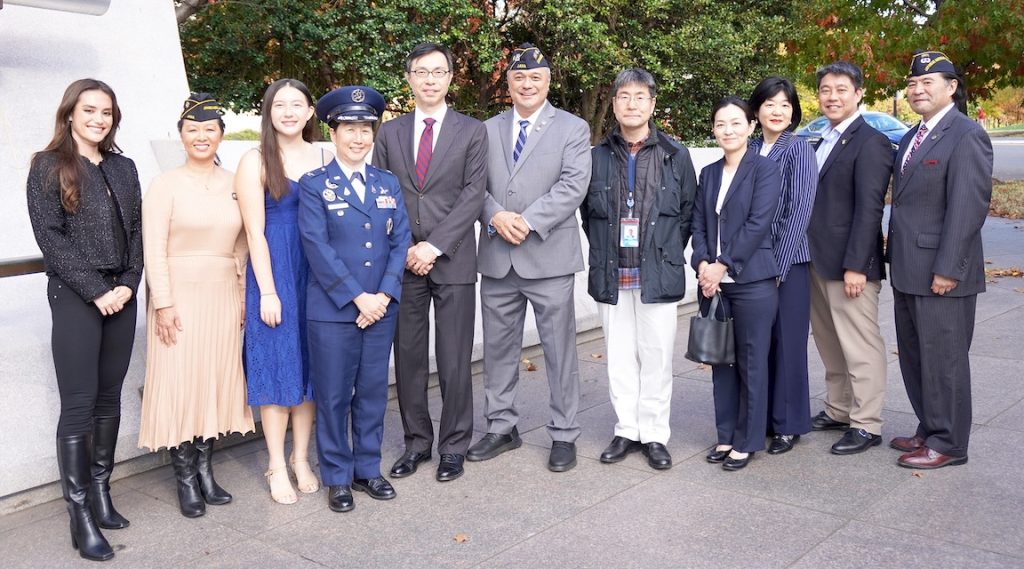
Dignitaries at the JAVA/NJAMF 2024 Veterans Day event in Washington, D.C. Pictured (from left) are Carolyn Hoover, NJAMF board member; Col. Danielle Ngo, U.S. Army, Ret., Veterans Day program MC and JAVA vp; Taylor Walsh and Col. Mia Walsh, U.S. Space Force; Masaru Sato, minister and head of chancery, Embassy of Japan; Howard High, JAVA president; Katsumi Ishiguro, consul, Embassy of Japan; Ryoko Nakanishi, first secretary, Embassy of Japan; Fumiho Suzawa, first secretary, Embassy of Japan; David Inoue, JACL executive director; and Lt. Col. Mark Nakagawa, U.S. Army, Ret., JAVA executive council member. (Photo: Patti Hirahara)



